Bankinvest expects mutual fund market to fundamentally change in 2021

A person dropping their annual trip to Paris throughout a whole working life could save 19 tonnes of CO2, but by investing green that same person could cut 557 tonnes off the same footprint, roughly speaking, according to an estimate made by Danish asset manager Bankinvest.
In that sense, green investing is seen as one of the key instruments the EU can use to achieve carbon neutrality from 2050, and mutual funds can play an important role in that regard.
That's why there are several new incoming policies set to arrive in the coming years, and Bankinvest Chief Executive Officer Lars Bo Bertram says these will change the business.
"I think it will completely overhaul the market. Perhaps not on day one, but it could change the way we conceive of sustainability in the financial sector," Bertram tells AMWatch's sister media, FinansWatch.
The first step in that direction will be the implementation of a new law in March, the disclosure directive, which will come to define what information mutual funds must disclose and how companies communicate about their investment products. Upon implementation, the ordinance will establish a series of sustainability parameters providing investors with greater transparency about a given product.
This autumn, the EU's MiFID II rules for investor protection will be updated to henceforth require that customers be asked whether they want to invest green while already filling out a clientele familiarity questionnaire prior to venturing their money.
New sustainability label
Running parallel to this, the EU Commission is also underway with the formulation of a taxonomy to define sustainable investment targets and by extension their opposites. This categorization will also be used when soliciting sustainable mutual funds pursuant of the disclosure directive, wherein articles 8 and 9 will become two discrete product definitions.
Article 8 is expected to set definition criteria for sustainable mutual funds as they are known today, with suppliers able to market funds based on ESG criteria. Meanwhile, article 9 will reportedly include an impact fund, whose express purpose is sustainable investment. In other words, such funds directly support sustainability objectives. Actually doing so, however, is easier said than done, Bertram deems.
"Having a pure impact product creates a partial competition with NGOs, and they have no required rate of return. So, it seems difficult to make a pure impact product and also get decent financial returns out of it. On the other hand, I won't say it can't be done," he says.
Further, the EU system is pursuing a final, green addition to the ordinance: The Ecolabel, a certification of sorts to signal the cream of the green mutual fund crop, not unlike various organic food labels used in supermarkets or the Nordic Swan label for a range of other products. The latter is in fact already used for a few sustainable mutual funds today, including two funds offered by Bankinvest.
With such a large volume of legislation on its way, several challenges have arisen for mutual fund suppliers. First and foremost, many details are still not ready so as to enable purveyors to begin developing new products.
"Undoubtedly, there are many moving parts in all this, and there's extreme pressure on us and the banks to incorporate all the new elements," Bertram says.
Acknowledges problems
The EU Commission refutes releasing the legislation with inadequate time for preparation concerning MiFID II and the disclosure ordinance. In regard to MiFID II, the Commission says there's plenty of time due to the amendment's expected arrival in February this year.
On the other hand, Bertram says he encounters understanding for the challenges posed by the taxonomy.
"We understand that the implementation timeline creates challenges, but we must offer reminders that the regulation as been changed as agreed upon by EU Parliament and member states," the Commission says.
Another issue involves doubts on the cohesion of the regulation's various aspects. As things appear right now, the Ecolabel is not an integrated part of the two articles from the disclosure directive, but builds, rather, upon criteria within the taxonomy.
That's to say, even if a supplier were to make a product that largely adhered to what the disclosure ordinance defines as a sustainable fund, receiving the Ecolabel is still uncertain.
"I hope this becomes properly integrated so as to provide a set of rules that clearly define what a sustainable product is – a kind of manual that lets us know if things are done in one way, then it's an article 8 product, and if things are done in another way, then it's an article 9 product," the Bankinvest CEO explains.
The disclosure directive is expected to be complete this spring, while work on the taxonomy will be an ongoing task. It's still unclear as to when it will be fully developed for mutual funds, but in any case, the directive will first enter into effect on Jan. 1, 2022.
English Translation: Daniel Frank Christensen
Danish asset manager wants to hunt foreign pension fund assets
Danish government to EU: Only limited updates to regulations on financial instruments, please
Norway's asset management association welcomes FSA's push to comply with MiFID II
















